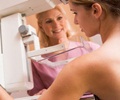A study says that rare mutations in the ataxia telangiectasia mutated (ATM) gene, combined with radiation exposure, might put a woman more at risk of developing a second cancer in the opposite breast.
A study says that rare mutations in the ataxia telangiectasia mutated (ATM) gene, combined with radiation exposure, might put a woman more at risk of developing a second cancer in the opposite breast.
Breast cancer survivors are at increased risk of developing a second cancer in the other, or contralateral breast, compared to women who have not had breast cancer.The ATM gene is known to play a role in cells' response to DNA damage caused by ionizing radiation, another breast cancer risk factor.
However, it is still unknown if women who carry ATM mutations are especially susceptible to radiation-induced breast cancer.
Thus, Dr. Jonine Bernstein, M.D., of the Memorial Sloan-Kettering Cancer Center in New York, and colleagues, compared ATM mutations among women who had developed a second cancer in the contralateral breast to mutations in those who had a cancer in only one breast.
The women were participants in the Women's Environment, Cancer, and Radiation Epidemiology (WECARE) Study, an international case-control study.
There were 708 case subjects-women with contralateral cancer-and 1,397 control subjects who did not have a second cancer but were similar to the case subjects in other respects, such as age and race.
Advertisement
For those who had received radiation therapy, the researchers estimated the amount of radiation to the contralateral breast using treatment records and radiation measurements.
Advertisement
The difference was statistically significant.
Women with both a mutation and radiation exposure also had a higher risk than women who had a mutation but no radiation exposure.
The authors noted that the missense variants were found in fewer than 1% of study participants.
They concluded that breast cancer survivors who do have such variants and who also received radiation may be at an elevated risk for a contralateral breast cancer.
"However, the rarity of these deleterious missense variants in human populations implies that ATM mutations could account for only a small portion of second primary breast cancers," they wrote.
The study has been published online in the Journal of the National Cancer Institute.
Source-ANI
RAS














